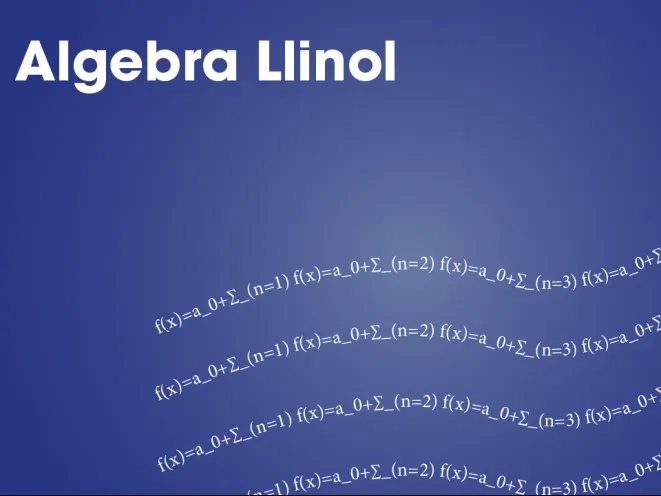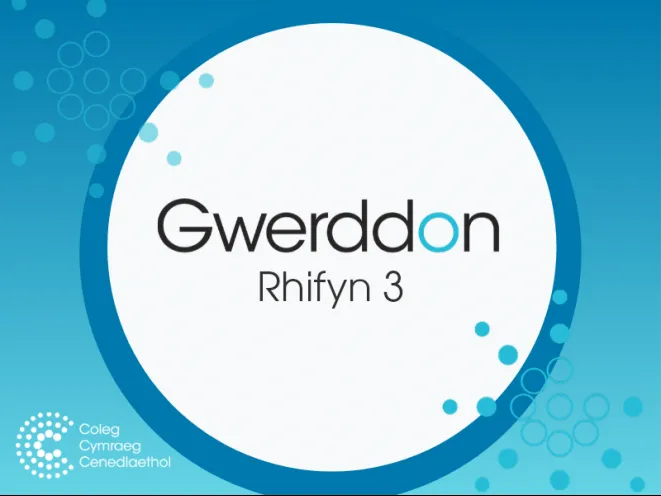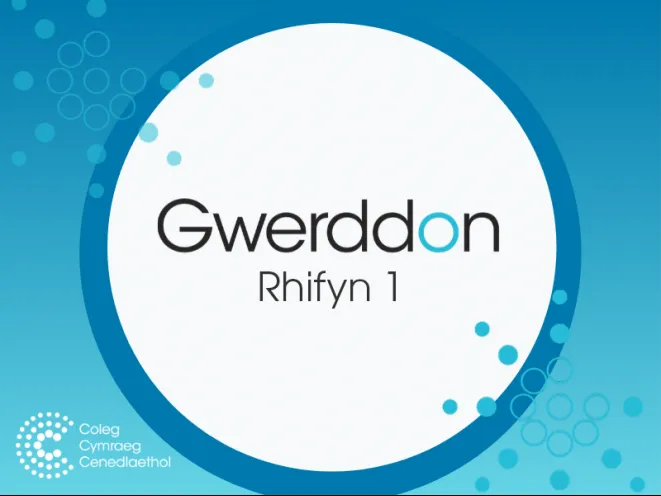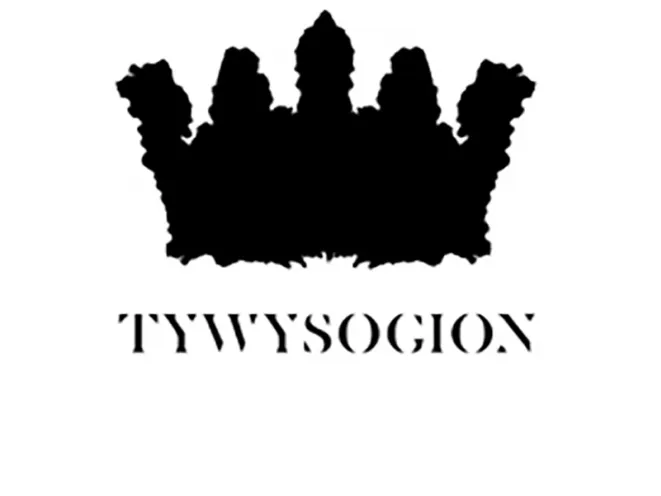This is a translation by Emeritus Professor Alun O. Morris from his book Linear Algebra - An Introduction, which first appeared in 1978 and was published by Van Nostrand Reinhold. A second edition appeared in 1982 and over the years there have been numerous reprints. The book was also translated into Greek and Turkish. Although the book has been out of print in English for some years now, it is clear that it is still being used at a number of universities and so it was decided to translate it into Welsh. The translation was originally located in Aberystwyth University's online research repository. https://cadair.aber.ac.uk/dspace/?locale-attribute=cy
Algebra Llinol - Alun O. Morris
Building Wales's bridges, Ben Barr (2008)
The paper reports on three epochs of bridge building in Wales. The first period, from Roman times to the start of the Industrial Revolution, was dominated by the use of local materials (stone and timber) by local craftsmen. The second period was an integral part of the Industrial Revolution when new bridge building materials (cast iron, wrought iron and steel) were developed and used in the construction of canal and railway bridges. The third period was associated with the growth of traffic following World War II when concrete and steel became the dominant bridge building materials during the development of the trunk roads and motorways. The paper shows, in simple terms, the fundamental structural engineering developments underpinning these developments as new materials became available for bridge building. In particular, the evolvement of various beam cross-sections, tubes and trusses is discussed. Attention is also given to the significant contribution of four world-renowned bridge builders: William Edwards who built the famous arch bridge at Pontypridd; Thomas Telford who built the Pontcysyllte Aqueduct and the Menai Suspension Bridge; Robert Stephenson who built tubular bridges at Conway and over the Menai Straits and I. K. Brunel who built the unique Chepstow Railway Bridge and the railway timber viaduct at Landore, Swansea. Finally, the paper draws attention to some of the unique bridges of Wales.
Speaking the language of the home when the home is unaffordable
Over the last quarter century, housing has become increasingly unaffordable for thevast majority of people. This article seeks to address what has caused this situation, and what its effects are on the individual and on the community. It will also consider how unaffordable housing and the lack of housing opportunities for local people affects the Welsh language. The article will then consider the mechanisms that have been adopted both by the National Assembly for Wales and by the Whitehall Government to resolve the inter-related problems of unaffordable housing and local people being unable to afford to buy houses in their local area, and the extent to which these solutions provide answers to this dilemma that are sustainable in the long term. To conclude, suggestions of how to improve the existing frameworks will be proposed, along with more radical approaches to ensure that housing does not become a luxury commodity.
(The voice of Welsh missionary women, 1887-1930)
This article explores the cultural implications of female celebrity acquired through involvement in the colonial missionary activity of the Welsh Presbyterian Church. Women were directed to perform particular functions in the process of constructing Christian communities in British colonies, among which were the conversion of other women and the provision of descriptions and explanations of the mission to a home audience. Along with lectures and sermons by missionaries on furlough, and missionary exhibitions, the main transmission route for this communication was the denominational missionary press. This article examines the ways in which the female missionaries presented themselves and their work to the audience at home in the missionary press between 1887 and 1930, and suggests that the images they presented, and the undertones that can be found in their writing, were the main inspiration for Welsh Presbyterian women to support the missionary cause, and form themselves into a remarkable movement that became a vital channel for the sponsorship of missionary work.
Tywysogion (2007)
Cyfres sy'n adrodd hanes saith o dywysogion Cymru, yng nghwmni Richard Wyn Jones. Ffilmiau'r Bont, 2007. Oherwydd rhesymau hawlfraint bydd angen cyfrif Coleg Cymraeg i wylio rhaglenni Archif S4C. Mae modd ymaelodi ar wefan y Coleg Cymraeg Cenedlaethol i gael cyfrif.
Annie Ellis ‘Cwrt Mawr’, the Aberystwyth Canorion Society and traditional folksong in Wales
This article outlines the valuable contribution made by Annie Ellis (neé Davies) to the folksong revival in Wales and in particular her influence in the Aberystwyth/Cardiganshire district during the early decades of the Twentieth Century. It draws on original correspondence, fieldwork diaries, notated transcriptions, newspaper articles (in Welsh and French) and phonograph recordings from the National Library of Wales, the British Library, Bibliotèque Nationale de France and private collections. The following areas are discussed: Annie Ellis’s involvement in folksong related activities at the University of Wales, Aberystwyth, including the establishing of the Canorion Society, folksong collecting competitions and performances of J. Lloyd Williams’s operetta, Aelwyd Angharad (Angharad’s Hearth). Six historically significant concerts of traditional Welsh music given by a quartet of undergraduate singers in Paris during March 1911, including performances at Le Lied en Tout Pays and the Richelieu Amphitheatre (Sorbonne). This visit represented the embodiment of the Entente Cordiale established between Britain and France during the years leading up to the First World War. Association with Madame Lucie Barbier (head of vocal studies at the University) and the positive response of the Parisian press. Ruth Lewis and Annie Ellis’s three day fieldwork visit to Landyssul, Pencader and the surrounding district in June 1913 and the outcome of their folk song collecting, including an evaluation of the texts and melodies collected. The article also highlights the role of one Edwardian woman in developing the cultural life of Wales and her attempts to promote Welsh traditional music on an international platform.
The flow of ionised atmosphere over the north pole
The paper investigates the structure and behaviour of the nighttime ionised (electrified) atmosphere in the polar and auroral regions; the region where the aurora borealis occurs. Of particular interest are plasma structures on horizontal scales of hundreds of kilometres. The observations presented were made by the radiotomography experiment of the University of Wales, Aberystwyth, which has four satellite receiving systems in the high Arctic near the north pole, at Ny Ålesund and Longyearbyen on Svalbard, Bjørnøya (Bear Island) and Tromsø on mainland Norway. Comparisons of tomography images with observations of plasma flow by the international SuperDARN radar suggest that large density plasma produced on the dayside flows across the polar region and into the night sector. The results contribute to the interpretation of physical processes that couple the Earth's environment with space, and are also of interest to users of radio systems where the ionised atmosphere can degrade the propagation of the signals.
(The nature of language acquisition processes in children: Marking grammatical gender in Welsh)
Research on the acquisition of grammatical gender has shown that in many languages children gain an early command of gender. Often in these languages gender marking is quite overt and provides a clear one-to-one correspondence between a marker and the gender encoded. In Welsh, however, gender marking is more complex. It is marked by mutations, a set of morpho-phonological changes that affect the initial consonants of words, and the mapping between mutation and gender is quite opaque. Two mutation types are used to mark feminine gender: both feminine nouns modified by the definite article and adjectives following feminine nouns undergo soft mutation, and the feminine gender of the possessive adjective ‘ei’ is marked by aspirate mutation of the modified noun. This paper presents two studies that examine children’s and adults’ productive command of gender as expressed in the mutation of nouns modified by the definite article, and adjectives modifying nouns. Children, between the ages of 4½ and 9 years old, and adults were invited to take part in the studies. First, a semi-naturalistic study was conducted to obtain knowledge about speakers’ usage of gender marking. A Cloze procedure was then used to elicit speakers’ production of masculine and feminine forms, with both real words and nonsense forms, in a variety of linguistic contexts. Some of these contexts provided cues to gender status, some did not. The data obtained indicated that the acquisition of the Welsh gender system is a long drawn-out process, and children have not mastered the system even by 9 years of age. Welsh speakers, even in adulthood, pay little or no attention to the possible cues present in the input. Results suggest that when a language has a complex gender system that is marked by opaque morpho-phonological processes the course of development is protracted and variable.
Implications of changes in the age profiles of Welsh speakers
Aitchison and Carter’s analyses of the Census over the last decades have succeeded in making the main trends concerning the spatial distribution of Welsh known to everyone with an interest in the future of the language. Even so, some aspects remain unexamined. This paper is an attempt to give a different view of the trends by presenting a number of new analyses. In the first part, language production between 1991 and 2001 that is the effect of the education system, is examined. It is shown that the introduction of the National Curriculum in Gwent led to the biggest changes. In the second part, the geographical distribution of Welsh-speakers is looked at, especially those areas where more than 70% could speak Welsh. Some indices are introduced in order to quantify the situation and to explain the significance of those areas. Lastly, the implications of spatial distribution (or social network) to the use of Welsh is discussed by consideration of a little probability theory.
(D.J. and I)
‘D.J. a fi’ draws on aspects of the work of Welsh author D.J. Williams and examines their potential to inspire the creation and inform the analysis of contemporary site-specific performance. Williams’s memoir, The Old Farmhouse, provides unique insights into the landscape of childhood, the located nature of memory, the dramaturgy of storytelling and the role of the teller. The author employs these insights to develop and suggest a number of practical and theoretical approaches to the use of biography, family history, domestic architecture and local knowledge in devised performance. Referring extensively to his own work, ‘Bubbling Tom’ (2000), a peripatetic solo performance staged in the village of his own upbringing in rural Lincolnshire: a guided tour of the places he knew at the age of seven – he discusses the importance of Williams’s work in inspiring dramatic forms that seek to reveal the grain of experience by addressing the intimate and familiar, the details of everyday life and its fabric.
Ideology and aesthetics in the drama movement
This paper examines the background and underlying assumptions involved in a public debate between Dr Kate Roberts and Dr Thomas Parry which was conducted in the columns of the Genedl newspaper in the early nineteen thirties. The subject of the debate was the policy governing the selection of plays for the annual performance of the Bangor students’ Welsh Drama Society. Since its ground breaking production of Ifor Wiliams’s translation of A Dolls House in 1926 the annual Bangor drama production had come to be seen as an event of considerable importance in the programme of the Drama Movement in Wales. However, the author of the article suggests that analysis of the aesthetic and cultural assumptions of the two authors – themselves figures of central importance at the time – raises issues of wider importance than the Drama movement itself, which continue to affect academic and cultural debate today.
(Citizenship, the Welsh Language Board, and marketing the Welsh language)
This paper offers a brief examination of the approach taken by the Welsh Language Board, as the principal language policy and planning body in Wales, to aspects of prestige planning and the Welsh language. It describes how devolution, and the recent, first ever, national review by the Welsh Assembly Government of Welsh language policy, provide the immediate context for the work of the Welsh Language Board. The key policy document resulting from that review, Iaith Pawb, is critically analysed and the relationship to it of prestige planning is identified. The Welsh Language Board’s practice of prestige planning is discussed in relation to the discourses of neo-liberalism and post-colonialism in a way that highlights the Board’s focus on consumers rather than citizens.






